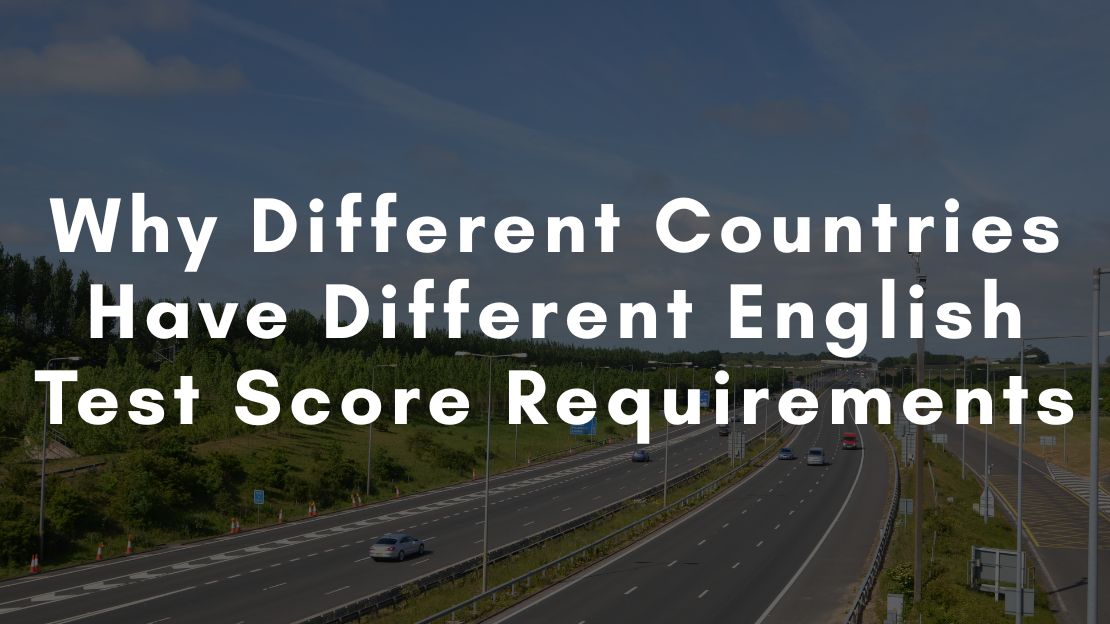 English proficiency tests like IELTS, PTE, TOEFL, and Duolingo are widely used by universities, immigration authorities, and employers worldwide to assess the English language skills of non-native speakers. However, different countries have different score requirements, depending on their specific education systems, visa policies, and job market needs.
English proficiency tests like IELTS, PTE, TOEFL, and Duolingo are widely used by universities, immigration authorities, and employers worldwide to assess the English language skills of non-native speakers. However, different countries have different score requirements, depending on their specific education systems, visa policies, and job market needs.
If you're planning to study or work abroad, understanding why these score requirements vary can help you set realistic goals and choose the right test for your destination. Additionally, enrolling in Coaching for PTE can provide structured guidance and expert strategies to help you achieve your desired score.
1. Purpose of English Proficiency Tests
English language tests evaluate a candidate’s ability to:
- Read and understand academic texts
- Write essays and reports clearly
- Listen to conversations and lectures
- Speak fluently in everyday and professional settings
The required score for each country depends on why they need English proficiency—whether for university admissions, work visas, or citizenship applications.
2. Education System and Academic Standards
Each country has its own academic standards, which influence English test requirements for universities.
United States
- Universities typically require TOEFL (Test of English as a Foreign Language) or IELTS.
- Top universities like Harvard or Stanford may require TOEFL 100+ or IELTS 7.0+.
- Community colleges may accept TOEFL 70-80 or IELTS 6.0.
United Kingdom
- IELTS is the most common test for UK universities.
- Undergraduate programs often require IELTS 6.0-6.5, while postgraduate programs may require IELTS 7.0-7.5.
- The UK also has a Secure English Language Test (SELT) requirement for visa purposes.
Canada
- Universities and colleges typically require IELTS or PTE.
- Competitive programs demand IELTS 6.5-7.5, while diploma programs may accept IELTS 6.0.
- Some institutions allow Duolingo English Test as an alternative.
Australia & New Zealand
- Universities usually require IELTS, PTE, or TOEFL.
- Bachelor’s programs may require IELTS 6.0-6.5, while master’s programs need IELTS 6.5-7.5.
- Vocational courses may have lower requirements, around IELTS 5.5-6.0.
The differences in score requirements reflect the level of English proficiency needed to succeed in each country’s education system.
3. Immigration and Visa Policies
Many countries use English proficiency tests as part of their visa requirements. The minimum scores vary depending on the type of visa.
United States (Work & Study Visas)
- Student Visa (F-1, M-1, J-1) – Universities set their own test score requirements, usually TOEFL 70-100+ or IELTS 6.0-7.5.
- Work Visas (H-1B, O-1, L-1) – English tests are not required, but strong English skills improve job prospects.
Canada (PR & Study Visa)
- Student Visa – Universities require IELTS 6.0-7.5 or PTE 58-65.
- Permanent Residency (Express Entry) – Minimum IELTS 6.0 (CLB 7) is required for eligibility. Higher scores increase CRS points, improving chances of selection.
United Kingdom (Skilled Worker & Study Visa)
- Student Visa (Tier 4) – Universities require IELTS 6.0-7.5.
- Skilled Worker Visa – Requires IELTS 4.0-5.5 for most jobs.
- UK Citizenship – Some applications require an English test at B1 level or higher.
Australia & New Zealand (PR & Study Visa)
- Student Visa – Universities require IELTS 6.0-7.5 or PTE 50-65.
- General Skilled Migration (PR) – Higher scores give more points. IELTS 7.0+ (PTE 65+) improves chances of approval.
Since different countries have different immigration policies, their English test score requirements vary based on the skills and qualifications they prioritize.
4. Job Market Requirements
For work visas and professional licensing, English test score requirements depend on the industry and role.
- Healthcare Professions (Doctors, Nurses, Pharmacists, Dentists)
- The UK, Australia, and Canada require higher scores (IELTS 7.0-7.5 or PTE 65+) for medical professionals.
- This ensures professionals can communicate effectively with patients and colleagues.
- The UK, Australia, and Canada require higher scores (IELTS 7.0-7.5 or PTE 65+) for medical professionals.
- Engineering & IT
- English requirements are usually lower (IELTS 6.0-7.0 or PTE 50-65), but strong English skills help in job interviews and workplace communication.
- English requirements are usually lower (IELTS 6.0-7.0 or PTE 50-65), but strong English skills help in job interviews and workplace communication.
- Customer Service & Teaching
- Jobs requiring direct interaction with English-speaking customers or students often need IELTS 7.0+ or equivalent.
- Jobs requiring direct interaction with English-speaking customers or students often need IELTS 7.0+ or equivalent.
Countries with high English-speaking populations tend to set stricter language requirements for professional licensing.
5. Test Preference by Country
Different countries prefer different English tests based on availability and testing policies.
Country | Preferred Tests |
United States | TOEFL, IELTS, Duolingo (some universities) |
Canada | IELTS, PTE, CELPIP (for immigration) |
United Kingdom | IELTS (UKVI for visa), PTE |
Australia | IELTS, PTE, TOEFL |
New Zealand | IELTS, PTE, TOEFL |
The choice of test often depends on government-approved test providers and how each test measures language proficiency.
6. Variations in Language Use & Accent Exposure
Some countries set higher English test requirements because their education or work environments demand a stronger grasp of English communication.
- The US, UK, and Australia have fast-paced English accents and complex academic vocabulary, so they require higher test scores for university admissions.
- Canada and New Zealand focus more on practical communication skills, so their English requirements may be slightly lower in some cases.
- Countries with multilingual populations (such as Canada) may accept lower scores since students and workers interact in multiple languages.
Conclusion
The differences in English test score requirements across countries are based on education standards, visa policies, job market needs, and test preferences.
If you're planning to study, work, or immigrate, make sure you:
- Check the specific test requirements for your target country.
- Choose the right English test (IELTS, PTE, TOEFL, etc.).
- Aim for a higher score than the minimum to improve your chances.
If you're preparing for your English test, joining PTE Exam Coaching in Ahmedabad or any structured coaching program can help you achieve the required score efficiently.
FAQs
1. Why do different countries have different English test score requirements?
Each country sets its own standards based on education systems, visa policies, job requirements, and immigration rules.
2. Which country has the easiest English test requirement?
Some European countries, like Germany and France, accept lower IELTS scores (5.5-6.0) for university admissions. However, visa requirements vary.
3. Can I apply to a university with a lower English score?
Some universities offer conditional admissions, where you can take additional English courses if your score is slightly lower than required.
4. Do all work visas require an English test?
No. Some skilled worker visas (e.g., US H-1B) do not require an English test, but strong English skills improve job prospects.
5. How can I improve my English test score quickly?
- Take mock tests to identify weak areas.
- Practice speaking, writing, listening, and reading daily.
- Join a structured coaching program for expert guidance.
If you're planning to Study PTE in Ahmedabad, structured coaching can help you achieve your desired English test score.


